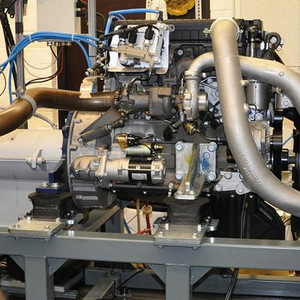Metathesis lowers biodiesel boiling curve, improves oil dilution

Photo: UFOP
October 1, 2013
BY UFOP
In general, pure biodiesel is not applicable in modern diesel engines with particulate filters, as the particulate filter regeneration process would lead to a dilution of engine lubricant by the biofuel. Also, larger shares of biogenic components in the fuel than the 7 percent that are permissible according to the [EU] diesel fuel standard are regarded as critical by vehicle manufacturers. The aim of a project carried out at the Johann Heinrich von Thünen-Institut in cooperation with the Karlsruhe Institute of Technology, the Institute for Internal Combustion Engines of the Technical University of Braunschweig, the Steinbeis-Transfer Center for Biofuels and Environmental Measuring, Coburg, and the Technology Center Automotive of the University of Applied Sciences in Coburg, was an adjustment of the boiling behavior of biodiesel to that of fossil diesel fuel. This approach should lead to a better use of the biofuel in conventional diesel engines.
The change of biodiesel molecules through metathesis, as a design tool, turned out as extremely effective for the adaptation of the boiling behavior of a fuel. Metathesis is a special chemical reaction, which is known from oleochemistry; however, until now it was not yet applied for tailoring of biofuels. Starting from rapeseed oil methyl ester (RME), composed largely of oleic, linoleic and linolenic acid, the catalyst-assisted metathesis reaction with 1-hexene as further reagent led to a variation of the chain lengths, which significantly influenced the boiling line of the produced fuel.
Advertisement
Advertisement
Then investigations of the fuels’ properties, such as the mixing with other fuels and engine oil as well as the material compatibility with selected polymers, were carried out.
Subsequent engine tests comprised both analyses of the burning behavior of the fuels as well as determination of the exhaust gas emissions. Besides the legally regulated emissions also these of ammonia, polycyclic aromatic hydrocarbons, carbonyls, mutagenicity and particle size distribution were examined.
Advertisement
Advertisement
In the result of all investigations carried out in this project, it can be stated that metathesis fuels seem very well suited for use in diesel engines, in particular with regard to their physical and chemical characteristics and their exhaust gas emissions.
To view the complete report, click here and then click on the report link at the bottom of the page.
Related Stories
Global digital shipbuilder Incat Crowther announced on June 11 the company has been commissioned by Los Angeles operator Catalina Express to design a new low-emission, renewable diesel-powered passenger ferry.
ATR and French SAF aggregator ATOBA Energy on June 19 signed a memorandum of understanding (MOU) to explore ways to facilitate and accelerate sustainable aviation fuel (SAF) adoption for ATR operators.
Argent Fuels, a leading provider of carbon-saving fuels in the UK, is accelerating its efforts to support a greener future. The expansion of its High Blend Biodiesel will supply to bus, coach, HGV fleets and rail in the south of the UK.
Sprague Operating Resources LLC on June 24 announced it has been selected by the New York City Department of Citywide Administrative Services to supply renewable diesel for its marine fleet, including the iconic Staten Island Ferry.
On June 17, the NYC Department of Citywide Administrative Services and the Department of Transportation announced the start of the Staten Island Ferry’s transition to renewable diesel, marked by the delivery of the first barge of fuel.
Upcoming Events










